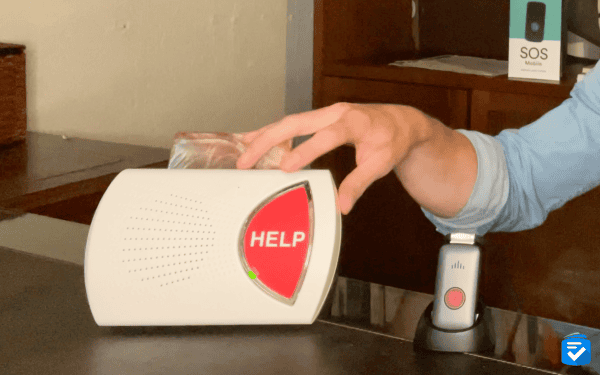The Best Medical Alert Systems for Hearing Loss in 2025
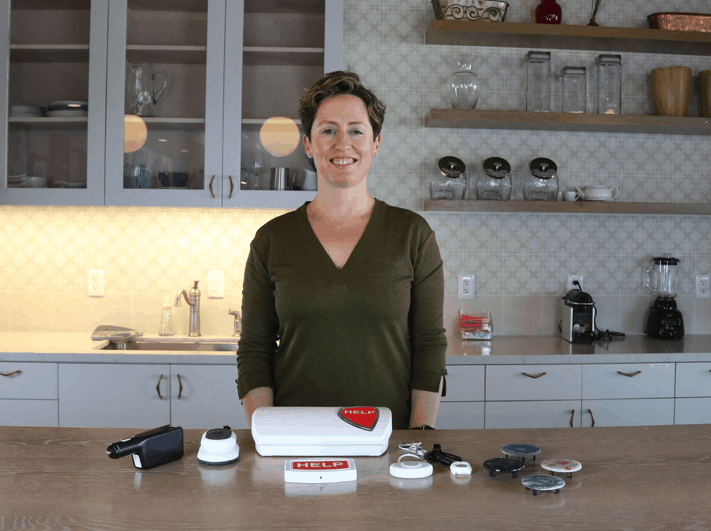
Key Findings
- As of 2025, no company makes a medical alert system for people with hearing loss.
- With loud speakerphones and quick response times, Bay Alarm Medical and Medical Guardian systems performed the best in our tests.
- At $24.95 per month for a cellular system, MobileHelp has the best budget option.

Why Trust Us?
At TheSeniorList, our team of caregivers, experts, and healthcare professionals conducted over 5,000 hours of in-depth research and testing to recommend the most reliable brands and devices. In this process, our team:
- Tested 50 medical alert devices from 15 different brands.
- Surveyed 1,250 seniors and caregivers on medical alert system usage.
- Consulted with nurses, EMTs, and caregivers who are experts at caring for older adults.
- Published dozens of videos that demonstrate our medical alert system testing.
- Evaluated verified customer reviews of medical alert companies from the Better Business Bureau.
How We Test Medical Alert Systems
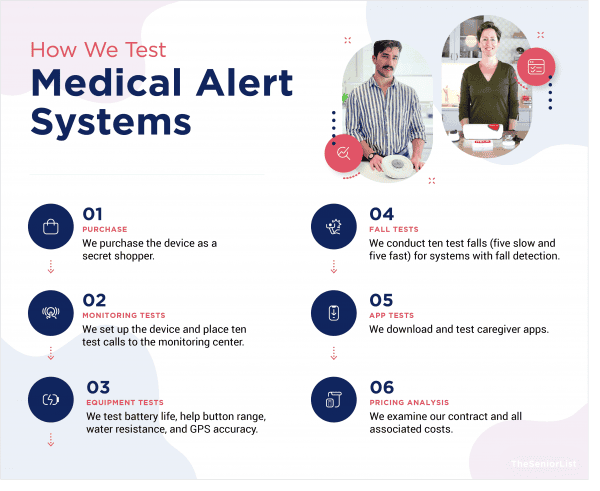
To evaluate the best medical alert systems for hearing loss, we utilized the following criteria:
- Pricing: Medical alert systems can be expensive devices that come with additional activation and service fees. I researched devices that offer value and don’t require long-term contracts.
- Comfort: Medical alert systems are useless if a person won’t wear them, so I prioritized comfort for daily wear.
- Response times: Response times factor heavily into the usefulness of a medical alert system, since a fast response can mean life or death in a medical emergency. All the devices on this list have industry-leading response times.
- Range: Medical alert devices call a dispatcher through a box placed in your house, and the range between the devices is not always unlimited. I listed the device ranges so you can figure out whether the system matches your house.
- Volume: Medical alert systems need a speaker that is loud enough to hear in an emergency. Focusing on users with hearing loss, I chose devices with speakers that are easy to use for anyone.
FYI: Looking for a medical alert system for as low as $19.95 per month? Check out my full rundown of the best medical alert systems overall.
Our Favorite Systems
- Bay Alarm Medical : Best for Landline
- Medical Guardian : Best for Caregiver Tracking
- MobileHelp : Best for Cellular
Our Top Picks
1. Bay Alarm Medical - Best for Landline
What We Like Most:
- Powerful speaker
- Sensitive microphone
- 32-hour battery backup
- Landline or cellular options
Overview
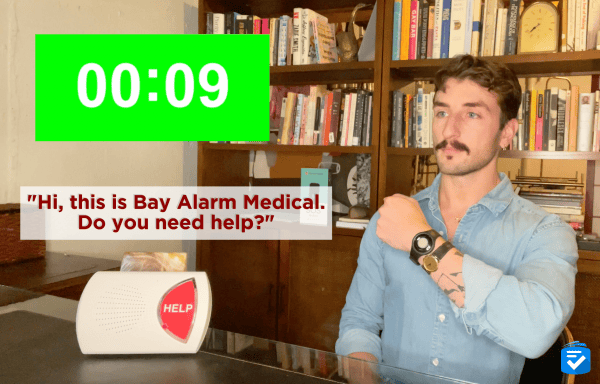
Medical alert systems that work with landlines have superior location data compared to systems that work with cellular networks. Bay Alarm Medical offers a landline system with a powerful speaker ideal for someone with hearing loss.
Standout Features
The SOS Home comes in both cellular and landline options, but I chose the landline one. Not only is it cheaper, but it also has more accurate location data, which is incredibly important in the event of an emergency.
The SOS Home’s base station has a speaker and a microphone, with volumes loud enough for someone with hearing issues to hear. It also comes with a help button that’s completely waterproof, which means it can be immersed in water and still work normally. I recommend adding fall detection to the help button so you can get help without pushing a button or uttering a word. In my testing, Bay Alarm Medical responded to my fall in just 16 seconds, and I could hear the person loud and clear through the base station’s speaker. As long as I was within 1,000 feet of the base station, the help button worked.
Pricing
I didn’t pay anything for the base station and help button. Instead, I paid monthly for monitoring, plus $10 extra for fall detection. The prices per month depend on the connectivity. For landlines, it’s $24.95 a month. For cellular, it’s $29.95 a month or $39.95 with fall detection. Bay Alarm Medical does not charge activation fees, and all contracts are monthly with a 30-day risk-free trial. For more information, read my article on Bay Alarm Medical costs.
The most affordable option is to use your landline, but that’s not an option for everyone. According to the Centers for Disease Control and Prevention’s latest 2022 data, nearly half of U.S. adults ages 65 and older live in wireless-only households, which means they don’t have landlines. Cellular is the only option for that group.
Drawbacks
Because the SOS Home is, of course, a home system, I had to be within 1,000 feet of the base station to stay connected with the monitoring center. That wasn’t the case with the MobileHelp Classic home system, which has a 1,400-foot range, or the MGMini, which I could take anywhere. If you have a larger home, the SOS Home may not make much sense.
Our Verdict
If you want a loud, powerful speaker on a landline-compatible home system, the SOS Home is the medical alert system for you. To learn about every option available from the company, read my review of Bay Alarm Medical.
Pros
- Landline or cellular networks
- Quick response times
- Optional fall detection
- 1,000-foot range
Cons
- Shorter range
- Bad Android app
2. Medical Guardian - Best for Caregiver Tracking
What We Like Most:
- Lightweight, small device
- Caregiver tracking through a web portal and app
- Mobile system
- Hourly GPS updates
Overview
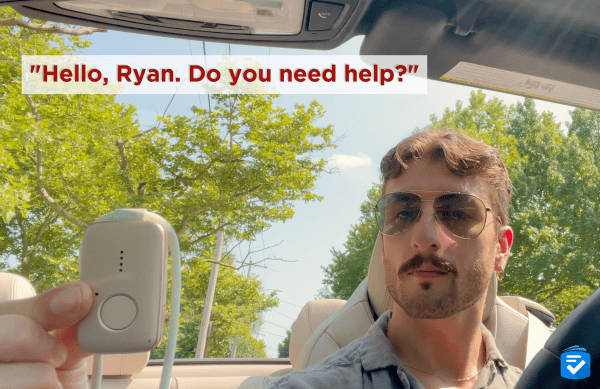
Medical Guardian sells three mobile systems and two home systems, both landline and cellular. For people with hearing loss, I recommend the MGMini, a small device with a surprisingly loud speaker.
Standout Features
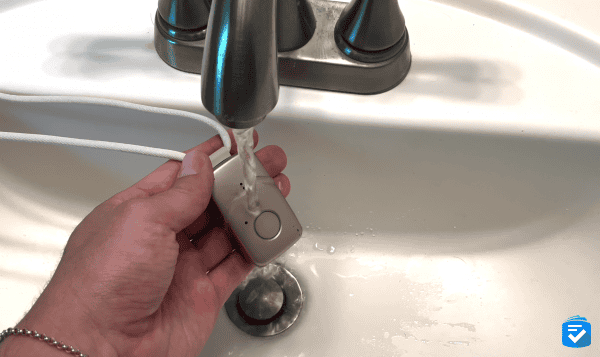
It’s not the size of the dog in the fight, it’s the size of the fight in the dog. That was the quote that came to mind when I tested the MGMini, a mobile system that weighs only 1.28 ounces and measures less than 3 inches long. Despite its small size, it boasts a voluble speaker that let me hear the monitoring center whenever I needed to, 24/7. Medical Guardian also has the fastest response times of any system I’ve tested at only eight seconds — half the length of the SOS Home. Sorry not sorry, Bay Alarm Medical!
The MGMini is also a good option for a person with hearing loss who has caregivers, since they’ll be able to track the device’s connectivity, system status, battery levels, and location through the MyMedicalGuardian app and a web portal. Caregivers can even chat with each other in the app, keeping the lines of communication wide open.
Pricing
Unlike Bay Alarm Medical and MobileHelp, Medical Guardian charges for equipment. For the MGMini, the up-front cost is $149.95 plus anywhere from $36.95 to $39.95 per month for monitoring and $10 extra per month for fall detection. You can choose monthly, quarterly or annual payments, but you’ll save money by signing up for a year. Bay Alarm Medical and Mobile Help offer 30-day trial periods, but that’s not the case for Medical Guardian, which does not offer any trial period whatsoever. If I wanted to return my equipment, I would’ve had to pay a $50 restocking fee and would not have received a refund.
Drawbacks
The biggest downside of Medical Guardian would have to be its higher costs. If price is of concern, either Bay Alarm Medical or MobileHelp will have cheaper systems, be they landline or cellular.
Our Verdict
A person with hearing loss may already wear hearing aids, so they’ll appreciate the discretion of the MGMini. See what other options Medical Guardian has to offer in my Medical Guardian review.
Pros
- Loud, clear speaker
- Small device
- Caregiver tracking
- Fast response time
Cons
- Inaccurate mobile apps
- No trial period
3. MobileHelp - Best for Cellular
What We Like Most:
- Waterproof help button
- No device or activation fees
- Caregiver tracking
- 1,400-foot range
Overview
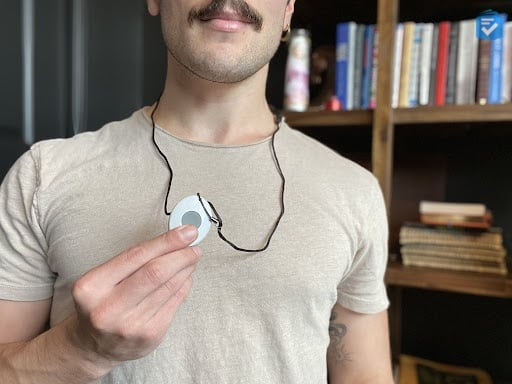
MobileHelp sells three in-home systems, two on-the-go systems, and three packages that combine the two. For people with hearing loss, I recommend the MobileHelp Classic, a cellular at-home system with loud two-way audio.
Standout Features
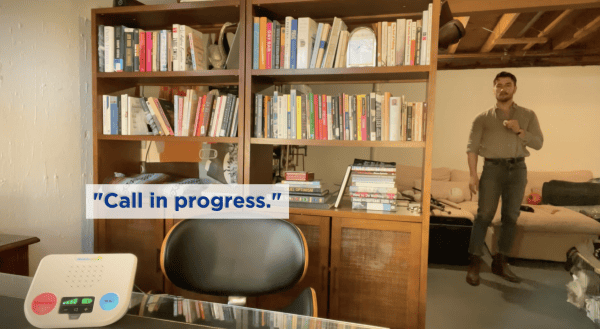
“Hello, this is MobileHelp. How may I assist you?” Those were the words I heard from my fall button 26 seconds after I did my test fall. They came out loud and clear from the MobileHelp Classic’s button, as well as the hub. The best part was that I didn’t even push an urgent-response button, since I added a fall button to my MobileHelp Classic kit, which included a hub and another help button.
MobileHelp offers the longest range I’ve seen from an in-home medical alert system. My help buttons worked as long as I was within 1,400 feet of the hub, which is more than enough for my cozy apartment and large enough for even the most spacious homes. Unlike the SOS Home system I tested, this option was cellular-only, which works for many wireless households across the country. I also appreciated that the help button was completely waterproof, not just water-resistant like the MGMini.
Pricing
Like with Bay Alarm Medical, MobileHelp does not charge equipment fees. Beyond that, monthly costs range from $24.95 to $34.95 with term lengths of one month, three months, six months, or 12 months. The longer you sign up for, the lower your monthly costs will be. Fall detection is an extra $11 per month, and it requires an additional fall button. That’s not the case for the SOS Home or MGMini. MobileHelp doesn’t charge any activation fees and offers a 30-day trial period, which is essential for someone with hearing loss who wants to make sure their medical alert button is functional for their hearing loss.
MobileHelp’s prices are super affordable, topping out at only $34.95 a month ($45.95 with fall detection). For Bay Alarm Medical and Medical Guardian, the maximum cost is $56.95.
Drawbacks
With the MobileHelp Classic system, getting fall detection required a separate fall detection pendant in addition to the wrist or neck pendant that came with my system. It was also more expensive than fall detection with Bay Alarm Medical and Medical Guardian at $132 a year, as opposed to $120. If you want a cheaper device that is fall detection–ready, the SOS Home and MGMini are what you’re looking for.
Our Verdict
With a loud speaker and optional fall detection, the MobileHelp Classic is a great option for a cellular in-home medical alert system. You can see what else the company has to offer in my MobileHelp review.
Pros
- Waterproof help button
- 1,400-foot range
- Optional fall detection
- No landline required
Cons
- 26-second response time
- Separate device required for fall detection
Are There Medical Alert Systems Made for People With Hearing Loss?
Unfortunately, there aren’t any medical alert systems made specifically for people with hearing loss. Medical alert companies, however, are aware that hearing loss is common in older adults. According to the National Institutes of Health, more than 20 percent of U.S. adults ages 65 to 74 have disabling hearing loss, and the rate increases to 55 percent for those 75 and older. That’s why medical alert companies make their speakerphones loud, with adjustable volumes.
There are also smartwatches with displays, which may be easier than dealing with a speaker from a medical alert pendant. There’s no way to get around having to talk to the monitoring center, however, so you may want to choose an Apple Watch over a medical alert system if you have hearing aids, since they are compatible with hearing aids.
What to Look for in a Medical Alert System
Here are the factors to look for in a medical alert system:
- Trial periods: Since you should wear your medical alert button at all times, it’s important that it fits comfortably and you’ll actually want to wear it. I appreciate companies that offer 30-day trial periods, during which you can test the equipment and get a full refund if you return it within that window. Bay Alarm Medical and MobileHelp both offer a trial period, while Medical Guardian does not.
- Long in-home ranges: Especially if you have a larger home, in-home systems should have ranges that allow you to stay connected to the hub or base station no matter where you are in your house. I’ve seen ranges from 600 feet all the way up to 1,400 feet with the MobileHelp Classic system, but what you’ll need depends on your home’s square footage.
- Caregiver apps: Caregiver apps let you track a device’s location, activity count, connectivity, battery level, and system status. Some even let you set medication reminders or call your loved ones through the button’s two-way audio. Make sure the app has high ratings in either the Apple App Store or Google Play store, depending on the make of your smartphone.
Bottom Line
If you have hearing loss, you’re not alone. Data from the American Association of Audiology says that hearing loss is related to aging, and it can occur quite gradually over time. That’s why it’s important to find a medical alert system with a loud speaker that allows you to hear the monitoring team.





